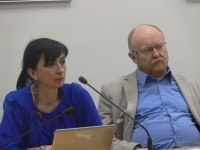Registration
You will receive an email confirming your registration.
IMGXYZ3124IMGZYXThe choice of Sochi as the host city for the 2014 Winter Olympics has prompted debate over the “Cherkessian issue,” sparking an upsurge in activity and division among Cherkessian public organizations. Naima Neflyasheva of the Russian Academy of Sciences’ Centre for Civilizational and Regional Studies discussed this debate at the Carnegie Moscow Center. Carnegie’s Alexey Malashenko moderated.
Cherkessians in Russia and Abroad
- Geographic distribution: The Cherkessian or Adyg peoples live in the Caucasus (both in Russian Caucasus and abroad) and in large ethnic communities in Turkey, Jordan, Syria, Israel, Libya, Egypt, the United States, France, and Germany. Various estimates put the number of the Cherkessian diaspora at 7-10 million people. The Cherkessians living in Russia have official nationhood (a relatively separate political identity with supporting Cherkessian language and culture) within three republics: two “dual-status” republics—Kabardino-Balkaria, where the Kabardins (Cherkessians) outnumber the Balkars, and Karachayevo-Cherkessia, where the Cherkessians are outnumbered by the Karachays—as well as the Republic of Adygea, where the Cherkessians are outnumbered by the ethnic Russian population.
- The problem of names: Since the thirteenth century, people have been using the term Cherkessian (or Cherkess or Circassian) to describe the Adyg people, Neflyasheva said. This group has different names in different parts of Russia: Adygeis in Adygea, Kabardins in Kabardino-Balkaria, and Cherkessians in Karachayevo-Cherkessia. During the all-Russian population census in 2010, Cherkessian youth and intelligentsia used leading Cherkessian websites around the world to campaign for all Adygs to use the single name “Cherkessians” under the slogan “One People—One Name—One Future”.
What is the Cherkessian Issue?
- A diversity of opinions: According to Neflyasheva, the “Cherkessian issue” is described differently by the main players involved in trying to resolve it, with different political forces and public organizations giving it different content. The Cherkessian public organizations in Karachayevo-Cherkessia, for example, emphasize restoring autonomy for the republic’s Cherkessian population within the Stavropol Territory, while public organizations in Kabardino-Balkaria emphasize restoring so-called inter-settlement territories (land lying between settlements) to their former status. Arsen Kanokov, head of Kabardino-Balkaria, told Expert magazine in a January 24 interview that the “Cherkessian issue” is really just an invented problem that three or four “sick people” are trying to raise.
- Three main components of the “Cherkessian issue”: Neflyasheva underscored that the three public movements—the Cherkessian Congresses (Circassian Congresses) of Adygea, Kabardino-Balkaria, and Karachayevo-Cherkessia—see the Cherkessian issue as consisting of three main problems. These problems are—someway or other—on the agendas of all Cherkessian organizations:
- Recognizing genocide: Cherkessian organizations all agree that there is a need to rethink the nature and consequences of the Russian Empire’s military action during the Caucasian War in the nineteenth century and to recognize it as a genocide against the native Adyg people;
- Citizenship: These organizations also call for dual citizenship for the members of the Cherkessian diaspora and the legal basis for their possible return to their historic homeland;
- Unification: They also discuss the possible uniting of the Cherkessians of Adygea, Kabardino-Balkaria, Karachayevo-Cherkessia, and the Shapsug people (also Cherkessians) of the Black Sea coast within a single and united region within the boundaries of the Russian Federation—Cherkessia.
- Recognizing genocide: Cherkessian organizations all agree that there is a need to rethink the nature and consequences of the Russian Empire’s military action during the Caucasian War in the nineteenth century and to recognize it as a genocide against the native Adyg people;
Debate over the Sochi Olympics
Starting in 2007, when Sochi was chosen as the host city of the 2014 Winter Olympics, the Cherkessian issue and all of its related problems became the subject of increasingly active debate. By 2010, Neflyasheva noted, the Olympics have somewhat polarized the Cherkessian public and political organizations. Moreover, Georgia has also started actively using the Cherkessian issue as a political tool of its own.
- Support for the Olympics: Neflyasheva noted that most Russian Cherkessian organizations, including the Board of Elders of Cherkessian People (Karachayevo-Cherkessia), the International Circassian Association, the organizations “Adyge Khase” (“Adyge Khasa”) in Adygea, Kabardino-Balkaria, and Karachayevo-Cherkessia, and other groups, support the Sochi Olympics, but they also call for a Cherkessian element to be present in the games’ organization, symbols, and cultural program.
- Opposition to the Olympics: The three Cherkessian Congresses of Adygea, Kabardino-Balkaria, and Karachayevo-Cherkessia all oppose the Sochi Olympics, Neflyasheva noted. They argue that the Olympics ignore the demographic and cultural tragedy that befell the Cherkessian people in the nineteenth century. The games should not be carried out if these facts are covered up. These organizations stress that Sochi, where the games will take place, has a special place in the Cherkessians’ historic memory. In the nineteenth century, it was a zone of the Abkhaz-Adyg people’s ethnogeny and a “center of Cherkessian ethnic upsurge” in the 1860s. Also, Sochi was one of the ports through which the Cherkessians were deported to the Ottoman Empire. This deportation decreased the native population of the western North Caucasus by 96 percent, Neflyasheva added.
Neflyasheva said that the Cherkessian issue should be the subject of broad discussion in the Cherkessian community and among Russian authorities as the Olympics draw closer.
The Olympics and General Instability in the North Caucasus
The Cherkessian issue does not represent any real threat to the Sochi Olympics at the moment, but Malashenko noted that the Olympics could have a big impact on overall instability in the North Caucasus. In addition, it is possible that radical Caucasus Islamists will attempt to carry out terrorist attacks timed with the games, said Malashenko.
